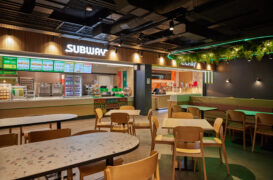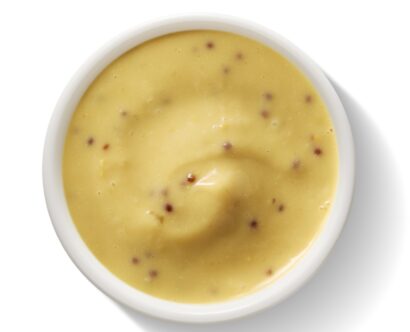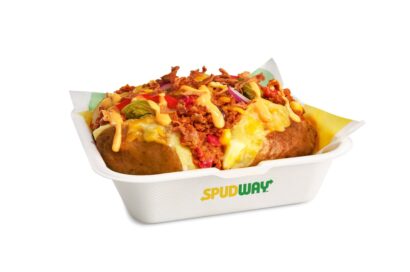02 April 2025

OUR COMMITMENTS
- Making Change for Good:
We’re taking a fresh look at how we make an impact on the world around us. It’s our responsibility and a key part of how we’re building a better, more sustainable Subway®. Our ambition is to reduce our environmental impact and preserve our planet’s health. - Meeting today’s needs with tomorrow’s solutions:
From our global supply chain operations to the local communities where our franchisees operate, we are working hard to reduce our impact on the environment. - Promoting Wellbeing:
We’re on a mission to help our guests live well-balanced lives by offering a wide range of delicious options that allow them to make informed choices that fit their lifestyles.
Food
Across the board, Subway® is committed to offering guests a range of freshly made meals while maintaining high food safety and quality standards. With a Registered Dietitian Nutritionist as part of the team, we are consistently reviewing new and existing menu options to continue meeting the expectations of our guests. Many of our core products are free of artificial colours and flavours.
While Subway® is well known for its famous footlong and 6-inch subs, guests can also choose from a range of menu items including subs, wraps, SubMelts® and salads. Evolving our menu with innovative choices, full of flavour, we’re focused on providing great quality food made fresh in store every day.
As part of the brand’s ongoing commitment to provide great tasting food experiences for its guests, Subway® has introduced a whole “new way to Subway®”.
The new Subway® Series menu, offers two ways to Subway®, by offering guests a choice of 15 specially crafted and mouth-watering ready to order recipes. Guests can also continue to create their own Sub, Wrap or Salad in the usual way. Combining new and improved fresh ingredients and including proteins, along with tantalising sauces, 80% of the new Subs, SubMelts®, Wraps and Salads are less than 500 kcal per 6-inch portion, while still being high in protein and low in sugar and saturated fats to suit guest’s dietary needs.
Reducing Packaging Waste
We are working hard with our suppliers to reduce unnecessary packaging by innovating and constantly reviewing our supply chain practices as we build a better Subway®.
Packaging plays an important role in protecting food quality and enhancing the guest experience. At the same time, we recognise the environmental impacts of material choices and packaging waste. Our packaging is designed to be reused and recycled, while also being functional.
By the end of 2022, we removed over 1.2m kg of single use plastic across our supply chain in Europe, while pilot programmes introducing reusable packaging are being trialled in restaurants across France and Germany.
Read our Global Sustainable Subway Packaging Policy here.
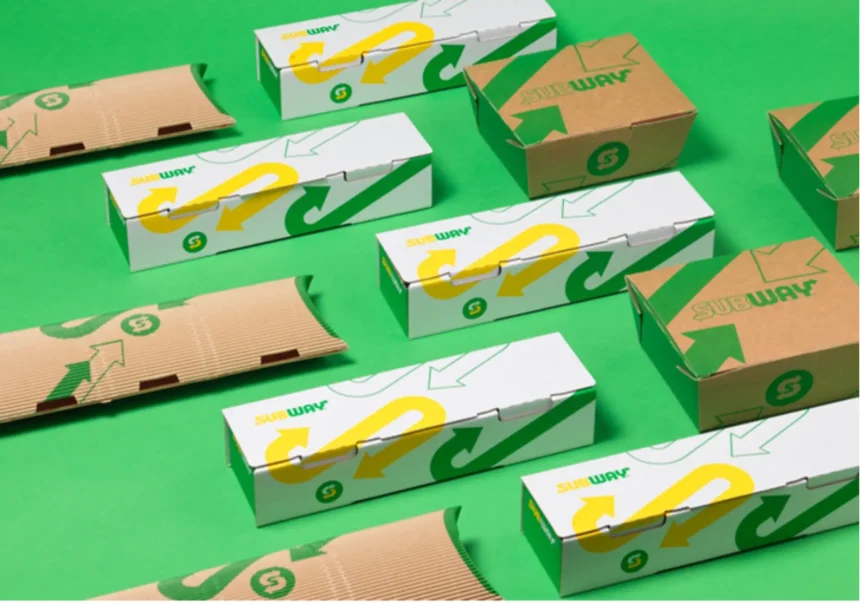
Uniforms
In May 2023, Subway® launched a new uniform, made from recycled plastic bottles. Each garment has been carefully designed to ensure comfort and durability, whilst maintaining Subway’s distinctive branding and iconic colour pallets.
The fabric used for the garments has been specially woven into a polyester blend* that uses recycled plastic bottles. Each uniform item clearly communicates how many bottles were used i.e., 3 bottles were used to make each cap, while 8 bottles plus a mix of BCI cotton (Better Cotton Initiative) were used to make the Sandwich Artists t-shirts.
To close the loop, Subway® worked with textile recycling experts Avena Group, to collect and process old uniforms which were replaced during the transition. The repurposed materials will be reused across industries such as automotive and construction, rather than go to landfill.
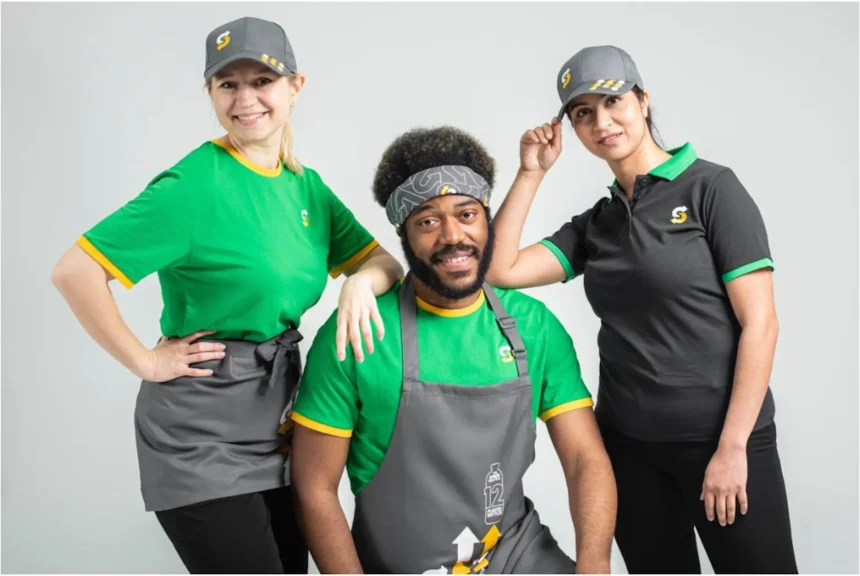
Approach to Climate Change
Subway® is committed to playing its part in addressing risks associated with climate change and we are working to better understand our climate impact.
To help franchisees reduce their energy usage, we have developed some essential best practices tips to help them reduce energy consumption.
Deforestation
Subway® understands that agriculture, a critical element of our value chain, is linked to the health of the world’s forest system. Our influence on forests is mainly through the sourcing of agricultural materials (palm oil, soy and beef value chains) and paper/wood-based products for disposable packaging and restaurant design. Subway® aims to source from suppliers that strive to:
- Use sustainable forest management practices in forests they own, lease, or manage to provide fibre, paper, timber and other forest-based products.
- Leverage principles and implement sustainable agriculture practices that enable farmers to increase production on currently farmed land and minimise impacts on the surrounding area.
- Preserve biodiversity and cultural values and optimise the social, environmental and economic benefits of managed forests.

Preserving our planet is critical, and we are continuously working to reduce our environmental impact through agriculture and supply chains. Subway® proudly serves communities across the globe and is committed to choosing supply chain partners that support high standards for environmental, animal and worker welfare.
Approach to responsible sourcing
Subway® works with IPC EMEA, an independent non-profit making organisation owned by Subway® Franchisees in the region, who provide purchasing, management, and supply of Subway® approved food, packaging, and services.
In partnership with our franchisees and IPC EMEA, the Subway® brand is committed to achieving a sustainable Subway and ethical sourcing and supply chain management. We support principles of responsible farming, fishing, and animal husbandry for the long-term sustainability of the earth’s natural resources and communities across the globe.
Vendor Code of Conduct
We are continuously working towards making the safeguards of our supply chain more robust and ensuring compliance to our standards. We are working with our supply chain partners to implement SEDEX membership to support compliance.
Sustainable Agriculture
By working directly with farmers, when possible, we believe we can improve the supply and quality of our ingredients, reduce environmental impacts, and play a role in building healthier communities across the globe. We strive to do our part in improving farming practices to preserve natural ecosystems and ensure a healthy global farming system for generations to come. At the same time, we recognise that agriculture is a local operation, each of which presents different opportunities and challenges when promoting sustainable agricultural practices.
Sustainable Fishing
We recognise the vital importance of sustainable fishing – both commercially and ecologically. Our long-term goal is to work with the industry to move to more sustainable practices worldwide.
Responsible Palm Oil Sourcing
Palm oil is used as an ingredient in a small number of Subway® products due to its desired characteristics and because it supports our initiative to eliminate added trans fats. We believe the Roundtable on Sustainable Palm Oil (RSPO) is the primary sustainability standard for palm oil products and have been sourcing RSPO certified palm oil for Subway® products in Europe since 2015.
Animal Welfare
Subway® believes that where our ingredients come from and how our animals are bred, raised, transported, and slaughtered are integral to preparing great food for our guests. We take the issue of animal welfare seriously and believe the ethical treatment of animals is an essential component of our commitment to responsible sourcing. Subway’s® animal welfare policy outlines our commitment to providing our guests with safe and quality food, in a responsible manner.
Our animal welfare policy is founded on the Five Freedoms principles proposed by the Farm Animal Welfare Council (FAWC) on the protection of animals kept for farming purposes.
As part of our ongoing commitment to improving animal welfare throughout our supply chain, we are happy to be working with Compassion in World Farming (CIWF), a widely recognised global leader in animal welfare. In collaboration with CIWF, we will continue to evaluate emerging and evolving systems and practices to advance long-term improvements in animal welfare throughout our global supply chain.
Subway® takes the issue of antimicrobial resistance seriously and believes that responsible stewardship of antibiotics in the raising of farm animals is an essential component of our commitment to responsible sourcing. Our policy is that antibiotics can be used to treat, and control disease, but not for growth promotion or routine disease prevention of farm animals. Antibiotics are never used to promote growth or used prophylactically. Subway® has developed a Global Antibiotics policy.
Click here to read our Animal Welfare Policy
Click here to read our Global Antibiotics Policy
European Chicken Commitment
At Subway®, we take the welfare of our chicken supply seriously. In 2021, we signed the European Chicken Commitment (ECC), which requires our suppliers* to review current practices and meet the standards for 100% of the chicken* in its European managed supply chain.
What is Subway’s® commitment?
Subway® made a commitment that it intends to adhere to the ECC with the understanding that achieving the ECC standard will require industry-wide change. We also commit to participate in industry wide roundtables and deep dive into the ECC with our suppliers to map out a feasible roadmap for transition. Subway® continues to work closely with Compassion in World Farming and its supply chain with the intent to create a viable roadmap to achieve long term change.
We can’t do this alone, and with the support of the industry and our suppliers we will continue to monitor our progress against six requirements to help transform 100% of chicken* welfare for the better in our European supply chain. Signing up for the European Chicken Commitment isn’t a tick-box exercise, we do it because we believe in the need for better chicken welfare, and the safety and quality of our product.
Where do we stand after a year?
Subway® requires suppliers to report on their chicken welfare and we have committed to assessing progress through supplier questionnaires, third-party assurance certifications and site audit reports. Listed below, is an update on the progress we’ve made to date since joining in July 2021.
- Nearly 40% of broiler chickens that are reared at stocking densities of 30kg/m2
- Approx. 40% of broiler chickens provided with specific environmental enrichment such as natural light
- 44% of broiler chickens provided with specific environmental enrichment such as perches and pecking substrates
- 13% leg cull rate in each year
- Nearly 50% of third-party auditing
The six ECC requirements
1. Comply with all EU animal welfare laws and regulations, regardless of the country of production.
2. Implement a maximum stocking density of 30kg/m2 or less. Thinning is discouraged and if practiced must be limited to one thin per flock.
3. Adopt breeds that demonstrate higher welfare outcomes: either the following breeds, Hubbard Redbro (indoor use only); Hubbard Norfolk Black, JA757, JACY57, 787, 957, or 987, Rambler Ranger, Ranger Classic, and Ranger Gold, or other breeds that meet the criteria of the RSPCA Broiler Breed Welfare Assessment Protocol.
4. Meet improved environmental standards including:
- At least 50 lux of light, including natural light.
- At least two metres of usable perch space, and two pecking substrates, per 1,000 birds.
- On air quality, the maximum requirements of Annex 2.3 of the EU broiler directive, regardless of stocking density.
- No cages or multi-tier systems.
5. Adopt controlled atmospheric stunning using inert gas or multi-phase systems, or effective electrical stunning without live inversion.
6. Demonstrate compliance with the above standards via third-party auditing and annual public reporting on progress towards this commitment.
Statement of Intent
Electrical waterbath stunning is the main method used globally for the slaughter of poultry. There are, however, significant animal welfare concerns with this method and in 2012 the European Food Safety Authority called for an end to its use [1]. Effective electric alternatives are yet to be developed. However, recognising that under halal standards, Controlled Atmosphere Systems may not be accepted as the animal must not be dead at the time of slaughter (cutting), it is a bare minimum that a stunning method which renders the animal insensible to pain, but still alive, is developed and adopted as soon as possible –
We Subway® agree to:
Actively press our suppliers and support the latest research projects [2] to find alternatives to electrical waterbath as a matter of urgency;
Support the call for the use of waterbath stunning to be banned by 2026, and new, more humane systems for the effective electric stunning of poultry without conscious inversion to be developed and commercially available by no later than 1st January 2026;
Commit to investing and adopting such a stunning method (without conscious inversion) as soon as it is commercially available.
*This applies to all fresh, frozen and processed chicken in Subway’s® European managed supply chain
Laying Hens
Subway® seeks to transition our entire supply chain to egg procurement practices with improved animal welfare outcomes. In Europe, 100% of the eggs we purchase are either free-range or cage-free*. Subway® has been sourcing free-range eggs since 2010, winning multiple “Good Egg Awards” from Compassion in World Farming (CIWF).
In regions where supply is limited, we are committed to working with the industry and suppliers to find solutions to source cage-free or free-range eggs.
18 March 2025
Subway Adds Hot Cross Buns to the Menu for Easter
19 February 2025
